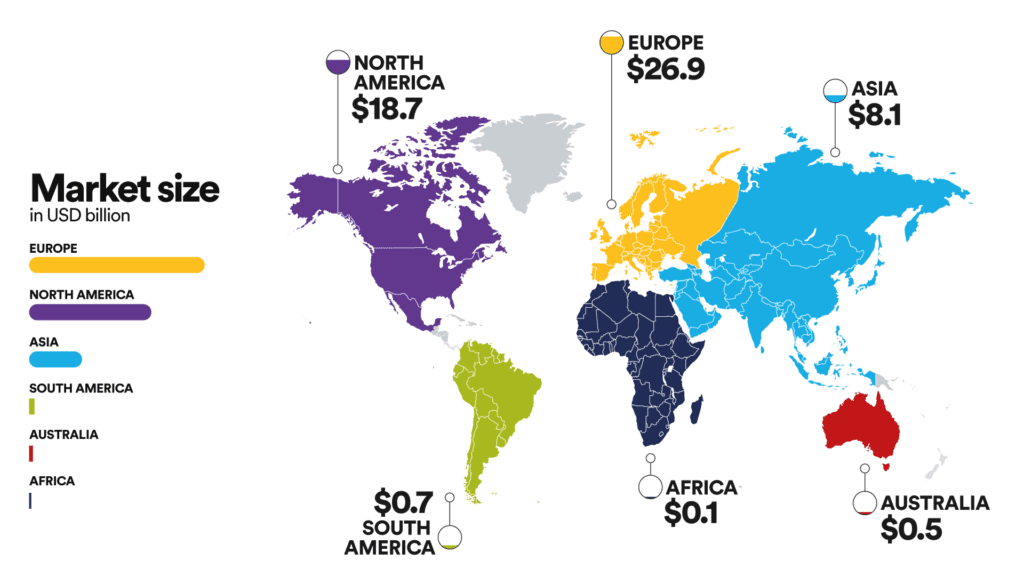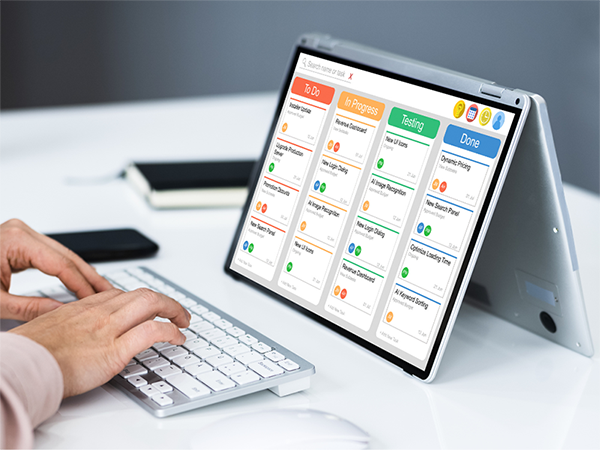Listen to the article
The localization industry is growing every year, with no signs it will slow down too soon. In fact, it represented a $55 billion market in 2020, being expected to reach $73.6 billion by 2025. Therefore, when acting in this market or planning to expand internationally, you’ll encounter, one way or another, the concepts of project management and localization project manager.

When targeting foreign markets, your gaming business has its own localization needs. But are you truly ready to expand internationally? Once you’ve decided the market(s) you want to target, the language(s) you need to localize into, and developed your localization strategy (while also considering the cultural, economic, religious, and legal aspects), you need to move on to the implementation stage as well as allocating your resources.
As you can imagine, coordinating all these efforts is a full-time job. And it’s where the localization project manager comes into the scene.
But,
What is a Localization Project Manager?
The localization project manager is the person who oversees the whole process of entering new markets. He is responsible for implementing the localization strategy of a company and managing translation projects from beginning to end.
And this means hiring, managing, and maintaining relationships with trusted linguistic specialist providers (LSPs), developers, designers, writers, as well as other internal and external team members and final reviewers to produce an efficient localization workflow that ensures your product/service and marketing content are well localized.
Do you really need a Localization PM?
From our experience, yes. Regardless of the size of your company or the number of markets you want to expand on, it’s crucial to have a person who oversees and coordinates all the business processes and tasks from every possible angle (i.e., subtasks, deadlines, stakeholders, etc.).
This is no different in the case of localization. You need a project manager who has the necessary skills, resources, and tools to ensure that there is a single source of truth within the project and that everyone understands their role and gets their work done on time.
The profile of a successful Localization Project Manager
As you can see, a PM must perform many tasks and supervise many processes. To be successful, he/she must have hard and soft certain skills, as well as leadership and organizational skills. Let’s see what they are:
#1 Tech-savvy
First and foremost, a localization project manager must be able to effectively work within the translation management system you choose. Knowing the ins and outs of the chosen software from both a PM and a translator’s point of view prevents any surprises.
#2 Communicative
When speaking about localization project management, there are many stakeholders involved in the process. The project manager must communicate (daily) with all of them to make sure that the deadlines are met, keep the projects under control, and be able to follow and report the progress. This means that he must be able to keep an open line of communication with everyone involved in the projects.
#3 Can prioritize

A localization project also involves many moving parts and a multitude of tasks. A PM must be able to assess and prioritize these tasks so that everything is delivered on time.
#4 A Localization Project Manager must be a born leader
The localization project coordinator must always know who is doing what within the project. He must be able to lead, delegate and coordinate a team and even train the team members on various methodologies or the use of the TMS they work with.
#5 Must be aware of the importance of the local culture
When building the localization strategy for a new country, a localization project manager not only has to make sure that the translations themselves are accurate, but he also must take into account all local aspects – starting with the cultural ones, and continuing with the religious, economic, legal, and technical ones.
They must be aware of both the importance of local elements and the contribution they have to create a real connection with new potential consumers. Therefore, a localization project coordinator must be open to knowing and understanding the different cultures of the world.
#6 Localization Project Manager should be multi-lingual
Successful PMs don’t need to be fluent in multiple languages, but it’s always a plus. However, they should be globally minded and can easily adapt to work both from the office and remotely, and in different time zones.
What does a Localization PM do?
The exact role and daily tasks of a localization project manager may vary from project to project, business to business, or even country to country. But generally speaking, the project manager is the person who coordinates the entire localization process.
Here’s for example, the job description of a localization project manager at Netflix:
“Netflix is a global product, and our Localization team needs to scale to support that. We are currently looking for a Localization Project Manager to help bring the Netflix experience to international markets.
As a Localization Project Manager, you partner with one or more Localization Program Managers for our different product components (business areas). You are responsible for all elements of the localization workflow, from request creation to job completion for an AB test, feature productization, or supporting the effort.
A successful candidate is a highly motivated individual who works comfortably and autonomously in a fast-paced environment. You have a demonstrated ability to manage priorities and projects and the right mix of organizational and communication skills.
Responsibilities:
- Manage localization projects and requirements across external vendors
- Work cross-functionally with Netflix stakeholders to identify critical business blockers and collaborate to solve and optimize these
- Oversee end-to-end localization workflow using our translation management tools and systems
- Identify and manage project risk through prioritization, bug management, and any other means necessary
- Manage independent projects within the program
- Drive high-quality output from localization vendors & freelancers
- Oversee the localization budget for your projects by gathering data on the cost, timeliness, and quality of your projects
- Contribute to project kickoffs & meetings with cross-functional groups for planning
- Manage & train different vendors, translators, and reviewers
- Evangelize Globalization to stakeholders
- Support innovation initiatives like A/B Tests”
It is hard to define where the job of the localization Project Mangers starts and ends – it looks rather like one continuous task. However, as you can see, there are some important responsibilities in the localization project manager role, and they can also vary based on the company’s needs you work for as a PM or the industry’s standards.
As a localization project supervisor, you have to tackle a myriad of tasks. One of the most important responsibilities is related to the TMS used by the company, in which you must be an expert (or at least have experience in using a TMS and learn the one chosen by the company extremely quickly).
The other important request is to be an expert user of at least one of the project management tools existing on the market.
Which project management tools do localization PMs use?

Kissflow Project – an all-in-one powerful tool is one of the best free project management software on the market. It offers all the capabilities of a modern project tool but it targets functional managers with an unstated project management responsibility rather than certified project managers.
Trello – is a leading online project management software with built-in collaboration tools to work with your teams. It’s lightweight, simple, and straightforward to use. It uses boards, lists, and cards to create tasks and stay organized. Users can collaborate within the cards, share files, and leave comments.
Asana – is a flexible SaaS project management tool with a focus on collaboration, with workflows that automate recurring tasks. It is intuitive with different task displays and supports custom fields and forms. You can even invite unlimited guest users. There are also options to build custom rules and approval workflows.
Zoho Projects – helps businesses keep track of tasks, collaborate, bug tracking, and run intuitive reports. The online project management tool offers features like Gantt charts and the ability to billable hours on multiple projects simultaneously. Zoho Projects also boasts a very impressive suite of communications tools, including real-time chat and forum pages.
Monday.com – Monday.com combines a visually appealing interface and useful project visualizing tools into intuitive, simple project management software. It’s flexible and offers a transparent way to organize your work. There are project templates on top which you can build your own boards. There are plenty of display options available like the map view and the calendar view.
How to be the best PM for your team

The most successful localization experts and managers (like any professional in any industry) always ask the right questions to find the best answers and make realistic and achievable projections.
At the same time, you must have good prioritization and organization skills, to obtain results (visual, linguistic, technical), while staying within the project budget.
A thorough understanding of the market and local customs will make you one of the most reputable. This can be learned (and proper certification plays an important role here, helping you gain credibility) or acquired through experience (a combination of both would be most effective).
You should also be able to speak multiple languages. As mentioned before, this is not mandatory, but it’s a great advantage. It helps establish proper communication with the translators and better estimate the timeframe for the localization project.
As a localization manager, you should also understand the translation services market. Thus, you can negotiate better terms and understand what requirements are realistic and what are not.
Final words
Whether you want to expand into a single market or multiple markets at once, or the size of localization projects, having a project manager to organize and oversee the entire process can significantly help smooth out what for many can seem like an impossible task.
At SandVox, our localization project managers are not service providers, but your strategic partners. They work hand-in-hand with you along the project, being able to communicate with important stakeholders and manage translator deliverables to provide a seamless translation workflow. Combining human skills with organizational ones and the right tool, actually innovate and get the most out of their team. Get in touch to find out more about how we can help you to successfully expand in the new markets.






